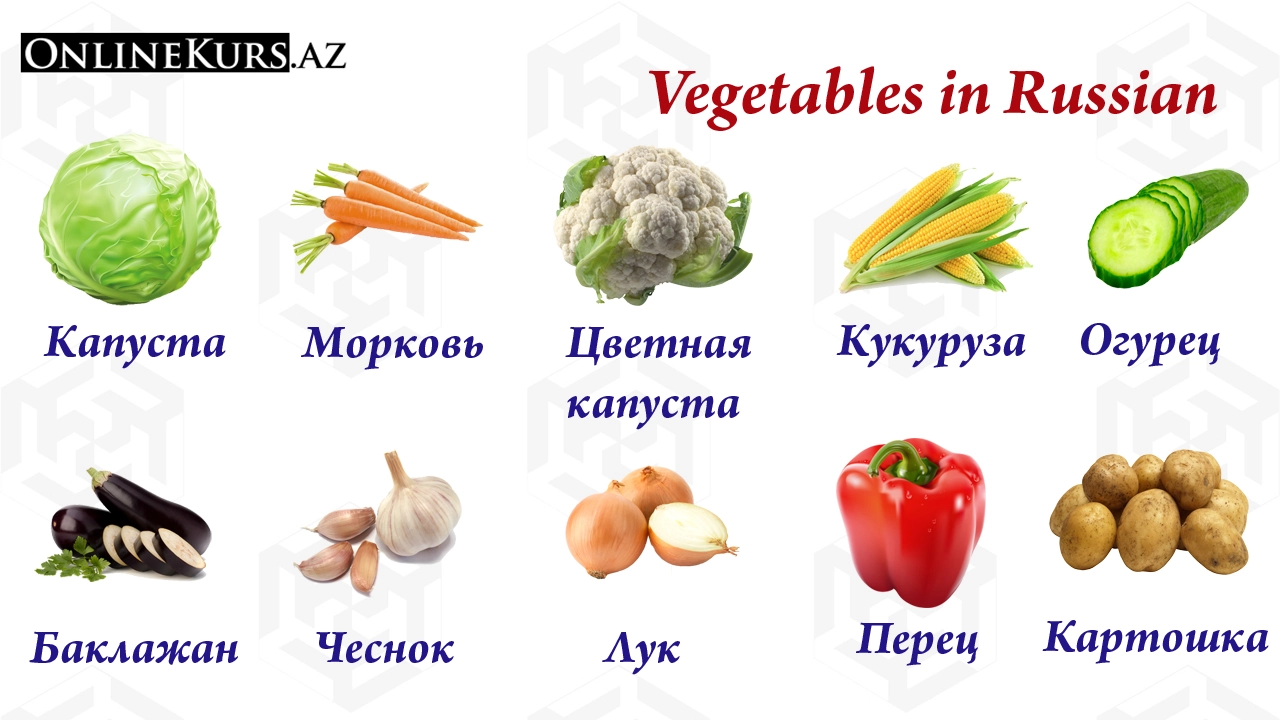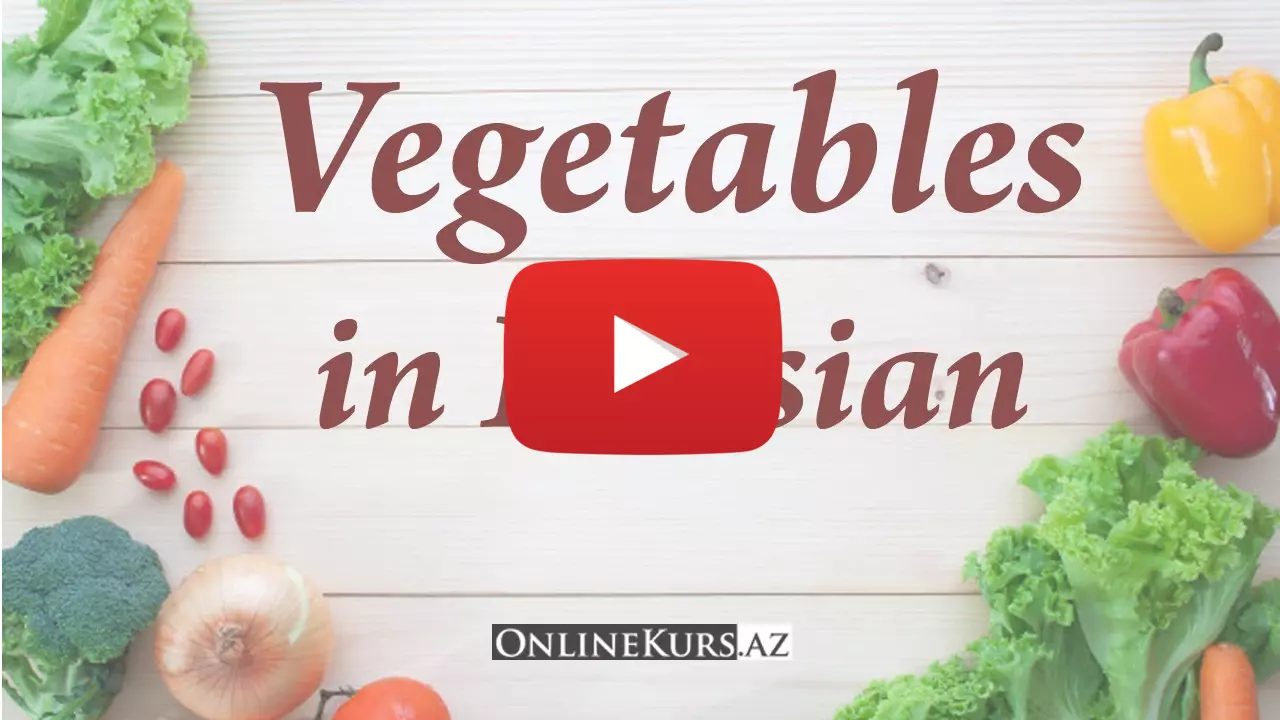Vegetables in Russian
In this lesson we will learn new words on the topic: Vegetables in Russian. Russian cuisine is rich in vegetables. Vegetables were also preserved in a number of ways so that people could eat plenty during the long winter months. Vegetables were very popular in Russian cuisine since ancient times, because Russians did not eat meat during fasting, and fasting could last more than 200 days a year. For this reason, although its nature is not suitable for Russians to grow vegetables mainly in the northern regions, Russian dishes are diverse in terms of vegetables.
The names of vegetables in Russian
We have prepared a list of vegetables in Russian to introduce you the names of vegetables in Russian and how to pronounce them. You can refer to this list when you need vegetable names in Russian. In the video above, you can learn the names of vegetables in Russian as a beginner, or repeat the names of different vegetables in Russian. Now watch the video and try to repeat the names of vegetables in Russian after me. This video is not just meant to help you pronounce words. Here you can also learn the correct spelling of vegetable names in Russian. This lesson is suitable for beginners. To help you remember the words, try to do the exercises listed below the video.
As we said in the last lesson, when any Russian-speaking foreigner wants to talk about your country, we usually talk about our national cuisine. Of course, in such a situation, we can not talk about it in Russian without knowing the names of fruits, berries and vegetables in Russian. We have already learned the names of fruits in Russian in the last lesson. If you haven't taken this lesson, be sure to check it out. In this lesson we will learn about vegetables in Russian. So it's time to learn how to name vegetables in Russian, how to write and pronounce them, so that after learning names of vegetables in Russian, you can easily talk to Russians about your favorite dishes.
The list of vegetables in Russian given in this lesson will be useful for those who want to cook traditional and delicious Russian soups "борщ" or "Солянка". Note: This is a soup you must taste if you ever visit Russia! Of course, after learning the lesson of vegetable names in Russian, you can buy the necessary vegetables from the market to cook a unique and interesting soup, and even order the dish you want in a Russian restaurant. Of course, you can shop or order in Russian on markets and restaurants without any problems. If you've heard about the most popular Russian salad "оливье", which is always on the table at New Year's Eve, so, all the vegetables you need to know in Russian are in this salad. If you learn vegetable names in Russian, you will be able to visit a Russian market where you can buy the best and freshest vegetables from locals. Learn vegetables in Russian and learn more about Russian culture and Russian cuisine. Other Russian language lessons which are in our site will be useful for you to learn more Russian words and at the same time learn Russian grammar.
I would like to bring to your attention that you already know the names of many some vegetables in Russian. For example: Russians call bananas - "банан", or they call kiwi as "киви". In short, I want to say that before you start learning the names of vegetables in Russian, you already know the names of some of them and even use them in everyday conversation. This means that you do not learn Russian from beginner level. So this example applies not only to vegetables in Russian, but also to many other topics that we will cover in our future lessons.

One of the easiest ways to memorize new words in Russian is to group the words according to the topic. It is important to know the words about vegetables in Russian, because we regularly use vegetables in our daily lives. We buy from the store, prepare food from them, grow them in the garden and so on. Even if you know the names of some vegetables in Russian, you can easily communicate on certain topics.
In addition, knowing the names of vegetables in Russian can be useful when travelling - when ordering a side dish in a cafe or restaurant, or when communicating with russian speaking people. When taking a russian speaking guest to a restaurant, he will definitely be interested in your national cuisine. Therefore, when talking to foreigners about dishes, you will not be able to explain anything to them without knowing the Russian names of vegetables.
Russians use vegetables in everything from soups to salads, appetizers to pies, meat and fish dishes. The most common vegetables are cabbage, potatoes and beets. Cabbage was used in stews, pickles, borscht, and pies, while beets were most common in borscht, soups, and vinaigrette salads.
Proverbs related to vegetables in Russian
"Не вырастишь овощей - не сваришь и щей." - If you don't grow vegetables, you can't cook shi (traditional Russian cabbage soup). (According to this proverb - if you want to get something, you have to do something for it. If you are lazy and do not want to work, you will not get much.)
"Козел на капустнике - плохой караульщик." - A goat in the cabbage garden - is a bad guard.
Spelling and pronunciation of vegetables in Russian.
|
|
[ `оващ’и ] | Vegetables |
|
|
[ карт`ошка ] | Potato |
|
|
[ марк`оф’ ] | Carrot |
|
|
[ агур’`эц ] | Cucumber |
|
|
[ пам’ид`ор ] | Tomato |
|
|
[ кап`уста ] | Cabbage |
|
|
[ св’`окла ] | Beet |
|
|
[ сл`атк’ий’ п’`эр’иц ] | Sweet pepper |
|
|
[ баклаж`ан ] | Aubergine |
|
|
[ л`ук ] | Onion |
|
|
[ ч’исн`ок ] | Garlic |
|
|
[ цв’итн`ай’а кап`уста ] | Cauliflower |
|
|
[ т`ыква ] | Pumpkin |
|
|
[ р’ид’`ис ] | Radish |
|
|
[ р’`эпа ] | Turnip |
|
|
[ фас`ол’ ] | Green bean |
|
|
[ кукур`уза ] | Corn |
|
|
[ гар`ох ] | Pea |
|
|
[ н`ут ] | Chickpea |
|
|
[ гр’`ип ] | Mushroom |
|
|
[ имб’`ир’ ] | Ginger |
|
|
[ хр’`эн ] | Horseradish |
|
|
[ п’`эр’иц ] | Pepper |
|
|
[ кабач’`ок ] | Courgette |
|
|
[ шп’ин`ат ] | Spinach |
|
|
[ бр`окал’и ] | Broccoli |
|
|
[ к’ин’за ] | Cilantro |
|
|
[ укр`оп ] | Dill |
|
|
[ п’итр`ушка ] | Parsley |
|
|
[ баз’ил’`ик ] | Basil |
|
|
[ с’ил’д’ир’`эй’ ] | Celery |
|
|
[ манг`ол’т ] | Chard |
|
|
[ з’ил’`оный’ л`ук ] | Scallion |
|
|
[ л`ук пар’`эй’ ] | Leek |
|
|
[ арт’иш`ок ] | Artichoke |
|
|
[ сал`ат л`атук ] | Lettuce |
|
|
[ сп`аржа ] | Asparagus |
We believe that the education should be free and available to everybody. This is why some time ago, we made a decision to continue developing as a completely free network. But we need the support of our readers to continue creating new content, keep the development going and pay related expenses. If you like what we do and find it helpful, consider supporting us by making a donation to our accounts.
